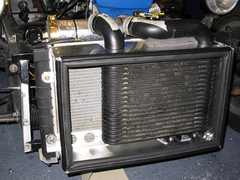charlierevell
|
| posted on 12/6/08 at 07:33 PM |

|
|
Radiator Ducting, Ideas and Pictures
Hope this is the right place!
I'd like to create a shroud for my rad to keep temps down a bit.
Can I have your ideas on what to use and how the best ways are to do it.
My idea is to create a metal shroud from the cone to the rad and seal it up so the air cant get around it.
help....
Thanks
Tango orange is an 'IN' colour!!
|
|
|
|
|
Dangle_kt
|
| posted on 12/6/08 at 07:52 PM |

|
|
eh.... wont that keep temps up?
|
|
|
robinj66
|
| posted on 12/6/08 at 08:28 PM |

|
|
No - it should force all the air passing into the nosecone to pass through the radiator matrix (as opposed to letting the air take the easier route
and bypassing the radiator)
|
|
|
Dangle_kt
|
| posted on 12/6/08 at 08:34 PM |

|
|
1st question is:
is the rad at 90 degrees to the air flow, or is it slanted?
|
|
|
BenB
|
| posted on 12/6/08 at 09:15 PM |

|
|
Is water temperature at speed really a problem? With the nosecone of a Se7en being what it is I'm always amazed that people don't have
enough air going through it.
Of course when I'm sat in traffic it's a different matter but that's a puny (and slightly knackered) fan that's to fault, not
ducting....
Water temps for me tend to be around 85/90 when on a blast, rising to 105-110 when sat in traffic  though the water temp is far left on the dash so
there is some parallax error (unfortunately in the wrong direction!!).... As soon as speed picks up again though the temperature drops pretty
rapidly... though the water temp is far left on the dash so
there is some parallax error (unfortunately in the wrong direction!!).... As soon as speed picks up again though the temperature drops pretty
rapidly...
|
|
|
charlierevell
|
| posted on 12/6/08 at 10:04 PM |

|
|
Well mine runs warm on a run, not mega hot. The bike lump doesnt seem to cause a huge amount of heat in the engine bay. Id just like to look at
getting more air thru the rad for track work etc etc....
Its on a slight angle back a the top...
Tango orange is an 'IN' colour!!
|
|
|
andylancaster3000
|
| posted on 12/6/08 at 11:20 PM |

|
|
It is true that a lot of air tends to go into seven style nose. However, it's just as important to get the heat out aswell. This generally
isn't a problem unless underside of the engine bay is panelled.
|
|
|
bimbleuk
|
| posted on 13/6/08 at 07:02 AM |

|
|
Basic principle is that the air inlet only needs to be 1/4 of the frontal area of the radator to get sufficient air flow. If you don't trap the
air against the radiator then it will go by the easiest route which will be any gaps/holes around the radiator. To stop the air reversing back out of
the shroud the sides should slant in from the outside edge of the radiator towards the middle.
Don't forget that the air will flow through the radiator best when the pressure is lower behind. So large engine bay vents to get the hot air out
is also a good idea. Venting the rear of the radiator to the top of the nose cone like on the latest Westfields and Chaterhams is even better.
This is my cowling for the intercooler and radiator on my Striker. The sides aren't slanted because the nose cone entrance is concave and sits
inside the cowling. Not exactly pretty but you can't see it unless the nose cone is taken off. No problems on the road and on track which is only
time I can use the power of my engine continusly again no cooling problems.
Since this photo I added a mini cowling for the intercooler as well to force some air through it.
 
Radiator cowling
[Edited on 13/6/08 by bimbleuk]
[Edited on 13/6/08 by bimbleuk]
|
|
|













